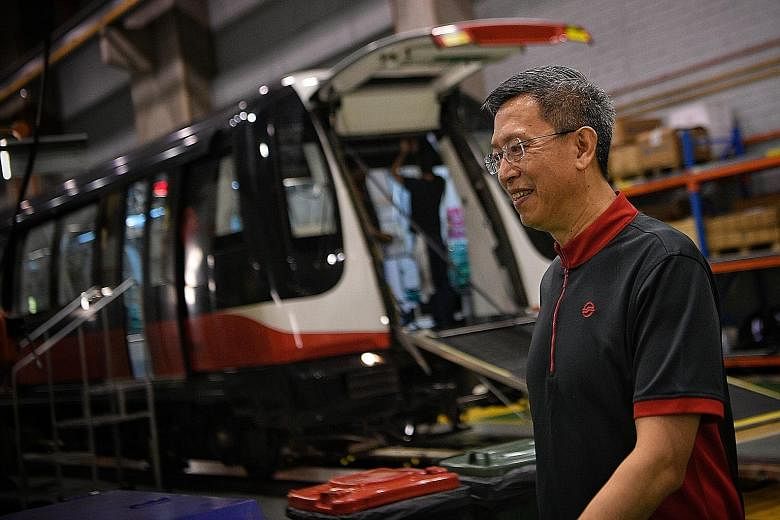SMRT's new chief executive Neo Kian Hong yesterday revealed a reorganisation of the transport operator that is meant to help take its engineering capabilities to the next level and improve the customer experience.
Denying there were "deep-seated cultural issues" within SMRT - a phrase which predecessor Desmond Kuek had used - Mr Neo said the move to reshape how the firm works is geared towards improving its core business of running trains.
Speaking to SMRT staff yesterday, three months after stepping into the job, Mr Neo added: "We must be able to develop capabilities to provide better services to our commuters."
While no timeline was provided, the 54-year-old told reporters that SMRT will be reorganised into five broad groups: trains, roads, experience, corporate services and a new engineering group.
The engineering group will focus on building SMRT's engineering, logistics and training capabilities, as well as the digitalisation of processes.
"Digitalising SMRT to have a connected workforce, harnessing data analytics that will drive knowledge creation and developing the next generation of supply chain management will enable SMRT to leap into the future," said Mr Neo, adding that SMRT hopes to develop "true local rail engineering capability".
Meanwhile, the experience group - which also oversees SMRT's advertising and retail businesses - aims to improve commuter experience in spaces such as train cabins and stations.
Mr Neo - who has previously said he gave up his car to take the MRT so as to better understand his job - said the move helped make commuter complaints about issues such as noise, heat or smells on the trains "totally personal", as he experienced them for himself.
The firm will also continue to grow its roads services - which include buses, taxis and private-hire vehicles - as well as improving the reliability of its train services, which Mr Neo described as SMRT's core business.
While Singapore's rail network is on track to hit its target of one million km travelled between delays of more than five minutes by 2020, Mr Neo cautioned: "The road ahead is still long."
Major renewal works on SMRT's North-South and East-West lines - Singapore's two oldest lines - are only halfway through, he noted.
Upgrading of the power supply started just last month, while track circuit replacement is due to begin soon and the replacement of 66 first-generation trains is set to begin in 2021.
It takes good leadership as well as engagement with staff on the ground to ensure staff perform, he told reporters.
"There are no poor soldiers, only poor leaders," said Mr Neo, a former chief of defence force who became SMRT's CEO on Aug 1.
Responding to queries on whether "deep-seated cultural issues" still existed, he said: "Based on my experience, our people want to do well. I do not agree with the term (deep-seated cultural issues) because that is not my experience when I engage with the ground."
The issue of "deep-seated cultural issues" within SMRT came under the spotlight last year when Mr Kuek - also a former chief of defence force - used the description to explain lapses within the organisation that led to the tunnel flooding incident 13 months ago.
Meanwhile, SMRT's adoption of the Japanese concept of kaizen, or continuous improvement - introduced by the firm's chairman Seah Moon Ming in February - is progressing, with more than 400 projects aimed at improving productivity and workflow processes in place as of last month.
On whether SMRT had regained commuter confidence since high-profile incidents such as last year's flooding, Mr Neo said: "People need time to be convinced, so let us continue to work at it. I am quite confident we will be able to do it. "


